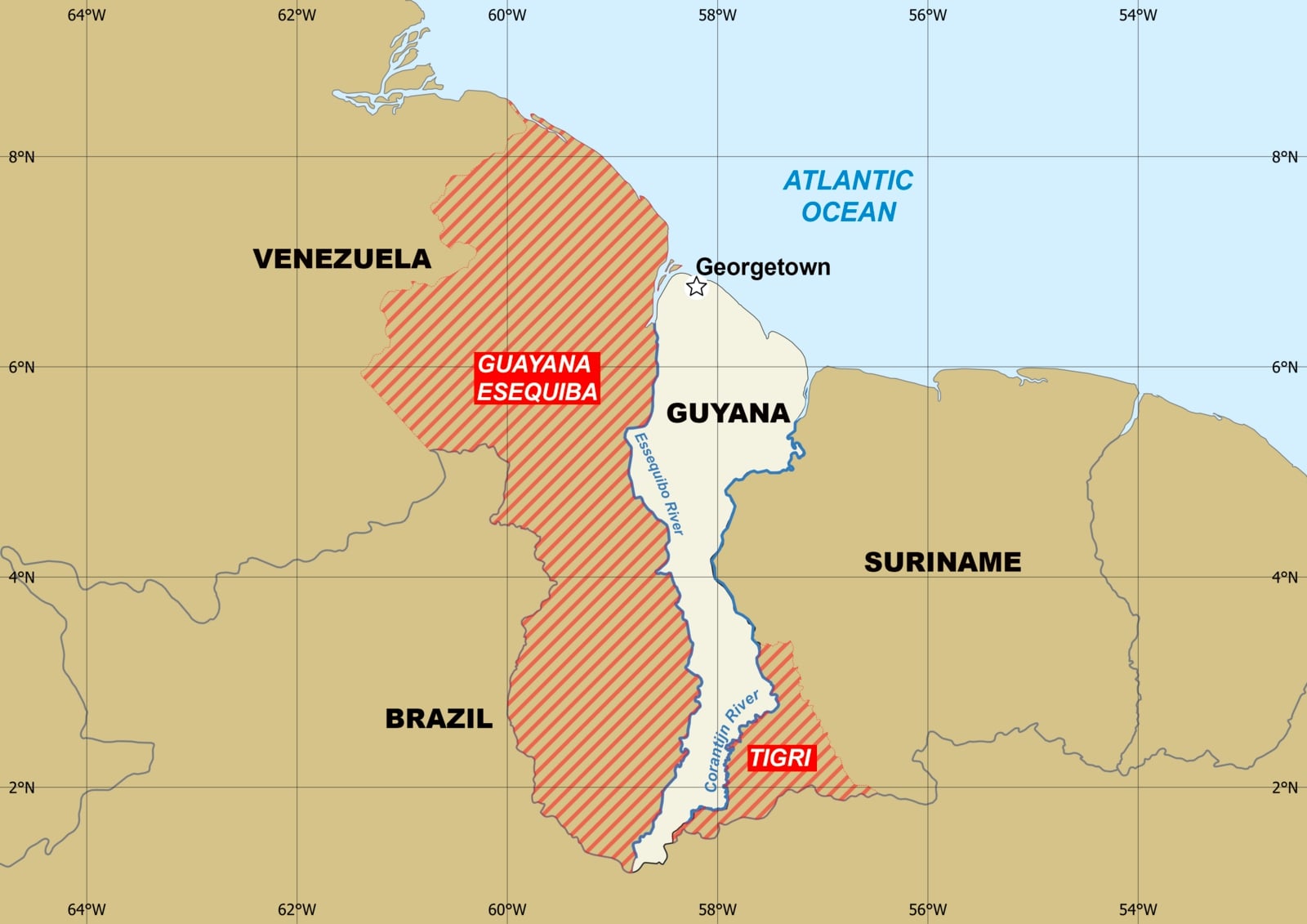War is brewing in South America as Venezuela threatens to take back disputed Essequibo territory from Guyana forcibly, and the United States (US) is throwing its weight behind the latter. Washington has held military exercises and “flight operations” with President Irfaan Ali’s armed forces.
US Slams China’s ‘Aggressive’ Actions In SCS After Chinese Coast Guards Blast Water Cannons On Filipino Vessels
The dispute surrounds a 160,000-square-km heavily forested (62,000-square-mile) border territory, the Essequibo River, and an offshore area recently found to have massive oil and gas reserves.
Both countries claim ownership of the sparsely populated territory whose much-disputed border was agreed upon under an 1899 decision when Guyana was still part of the British Empire. Venezuelan President Nicolás Maduro’s government maintains it rejects the “arbitrary” boundary drawn by what it perceives as foreign Colonial powers.
The US, on its part, has thrown its weight behind Guyana, consistent with its long-running opposition to Venezuela, which it has placed under sanctions since the times of the late President Hugo Chavez and now his successor, Maduro.
Meanwhile, Venezuela’s President Nicolas Maduro will meet Guyana President Mohamed Irfaan Ali amid the territorial dispute, according to a letter from the prime minister of Saint Vincent and the Grenadines.
“The presidents will meet in [the island nation of] Saint Vincent and the Grenadines on Thursday, December 14, 2023, under the auspices of CELAC (the Community of Latin American and Caribbean States) and CARICOM (the Caribbean Community), on matters related to the border dispute between Guyana and Venezuela,” the country’s government said in a communique.
Venezuela Wants ‘Territory’ Back
The US embassy in Georgetown said in a statement that the US Southern Command, which oversees military operations in Central and South America, would “conduct flight operations with the Guyanese military” and that the drills were part of “routine engagement and operations to enhance (the) security partnership between the United States and Guyana.”

Caracas views this as foreign military intervention in a regional dispute. White House national security spokesperson John Kirby said Washington supported a peaceful resolution to the border dispute, suggesting it would avoid a military intervention.
Brazil, too, has stepped in, conveying its opposition to a military clash that might destabilize the Latin American economy by sending troops to its border with Venezuela.
Any military incursion by Venezuela will be “logistically challenging” as Venezuelan soldiers would have to cross Brazilian territory to enter Essequibo because of challenging terrain elsewhere.
AFP quoted Brazil’s army saying it is reinforcing its presence in the region as part of efforts to “guarantee the inviolability of the territory.”
Origins Of The Dispute
But what sparked the tensions was a referendum last week in Venezuela, where “more than 95 percent” of the voters reportedly supported the government’s claim to Essequibo.
Voters also rejected the International Court of Justice’s (ICJ) jurisdiction over the case. Analysts quoted by Reuters said this is an attempt by Maduro to show “strength and gauge support for his government ahead of 2024 presidential elections.”
A consortium by Exxon Mobil, China’s CNOOC, and US Hess began oil production in Guyana in 2019, currently at roughly 400,000 barrels per day (bpd), expected to rise to more than 1 million bpd by 2027. It has sharply boosted Guyana’s economy and promises to raise its income over the years.
Though Venezuela sits on the world’s largest crude reserves and massive deposits of natural gas, its production plummeted in recent years “owing to US sanctions, alleged corruption and deteriorated infrastructure,” Reuters added.
Maduro has announced oil exploration in the Essequibo with state oil company PDVSA and state iron-and-steel maker CVG.
Russia ‘Unofficially’ With Venezuela, ‘Officially’ Neutral
Russia, a traditionally close Venezuelan ally, on its part, has taken a neutral position. Ministry of Foreign Affairs spokesperson Maria Zakharova said while Moscow is “closely following the developments around Essequibo, (it views) this as a matter of Venezuela-Guyana relations (that) should be settled in a neighborly way.”
Considering previous Russian allegations of US interference in regional disputes elsewhere in the world, it can be said that its neutral position indirectly criticizes Washington. Moscow has long accused Washington of preventing the concerned countries from settling conflicts diplomatically.
Moscow has, however, not so far directly named the US, nor has it officially exchanged diplomacy or communicated with Maduro, indicating it also does not want to be indirectly involving itself in the dispute. Neither have there been reports of Caracas seeking Russian intervention, implying Maduro does not desire to turn it into a flashpoint for more considerable Great Power rivalry.
Such a move will not sit well with even other South American countries opposed to the US. Put differently, Venezuela is mainly alone in the conflict, with only diplomatic backing from Russia and chances of facing the US military’s Southern Command if it resorts to force.
A section of foreign affairs commentators also suggests that Caracas’s contention is with ExxonMobil, which it perceives as weaponizing Guyana’s government. This is also reflected in Nicolás Maduro’s administration, and diplomats have not yet been reported to attack Guyana or President Irfaan Ali in their statements.
The approach can be said to be serving as a signal to Guyana that Caracas would be receptive to dialogue.
- The author can be reached at satamp@gmail.com
- Follow EurAsian Times on Google News